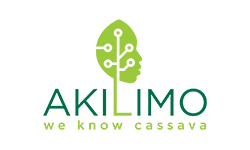JPDM and UAM Gradually Resume Training of Farmers while Adhering to COVID-19 Safety Measures
Extension agents working under the Justice Development and Peace Movement (JDPM), Oyo and the University of Agriculture Makurdi have concluded plans to resume training activities previously halted by the COVID-19 lockdown across the country under a cautious regime. The training activities will adhere strictly to the rules on physical distancing set by the country on COVID 19, coordinators from JPDM and UAM have said.
The two organizations are partnering with the African Cassava Agronomy Initiative (ACAI) of the International Institute of Tropical Agriculture (IITA) for the dissemination of the AKILIMO decision support tools to farmers in Oyo State and Benue State.
Both JDPM and UAM commenced full dissemination activities in 2019 and have so far covered dozens of rural communities and local government areas in the two states; gathering farmers at their homes, village squares, under trees, community schools, and churches. Using battery-powered mobile projectors, videos, and other paper-based tools developed by ACAI, the organizations (through their extension networks) are teaching farmers best weed control methods, safe use of herbicides, and best planting practices in cassava-maize farming systems.
The training activities were however halted over a month ago following the outbreak of COVID-19 and lockdown measures put in place by the state and federal governments to curtail the pandemic in Nigeria.
But at separate meetings held recently at the JDPM office in Oyo and another in Benue, the extension agents resolved to resume training under COVID 19 regulations set by the government to ensure that cassava farmers were armed with best-bet weed control and planting techniques as the farming season begins.
Godwin Atser, IITA, and ACAI Digital Extension and Advisory Services Specialist, who was present at the meeting in Oyo, commended the extension agents for the work they did before the lockdown. He stated that “recommencing the training at this time is a humanitarian gesture to farmers to enable them to avert hunger and cushion the effects of the looming economic recession.”
The trainings will be conducted based on government COVID-19 safety rules and regulations which allow a limited number of persons to gather while maintaining a physical distance.
Other safety measures harped upon at the meeting included the proper washing of hands and compulsory use face masks by trainers and trainees at every training event. Farmer Field days which are to come up soon will also be conducted under COVID 19 rules.
Godwin, who expressed his appreciation to the extension agents for their hard work and cooperation towards the success of the ACAI project, stressed the need to follow up on farmers who have been trained and have adopted the intervention in order to serve as points of reference to others.
The meeting, which used its sitting arrangement to illustrate how the extension agents could ensure social distancing at their training venues, also made plans for advocacy visits to community and local government leaders to ensure the sustainability of the project.
At the end of the parley, safety kits (nose masks, hand wash, buckets with water taps) were distributed to all the extension agents present.
Also present at the meeting were the JDPM coordinator, Rev. Fr. Gabriel Adeleke and the dissemination project leader for JDPM, Mr. John Fakorede.

